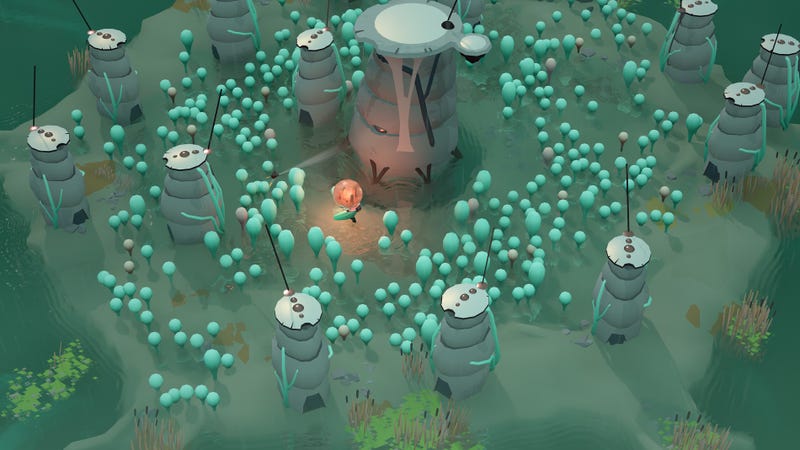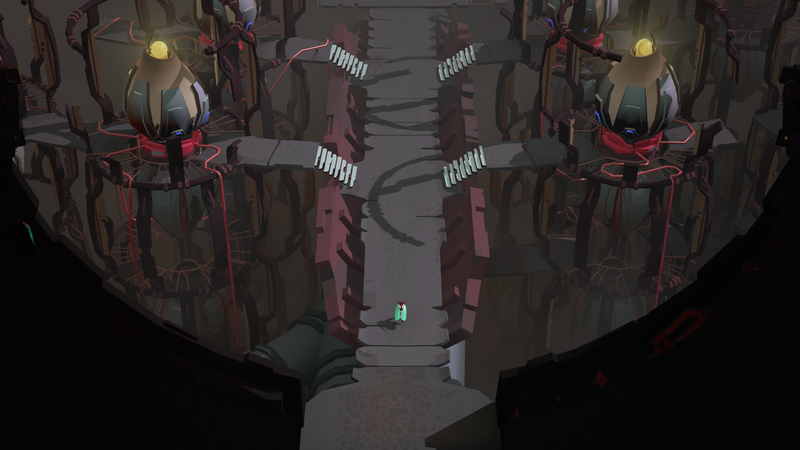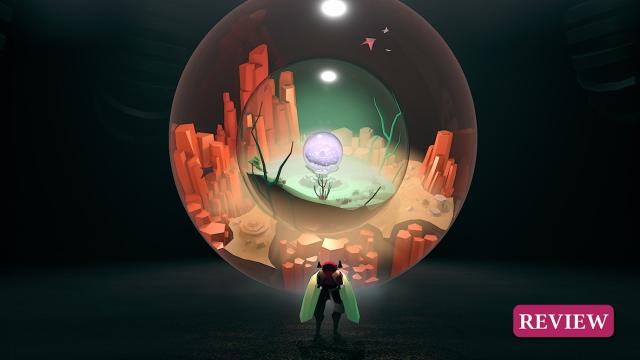There was a moment near the end of Cocoon when my brain could not keep up with the game. Like being curled up in a wave and then flipped head over heels against the surf, my mind sluggishly tried to work backwards what precisely had just occurred. Where did I just come from? How did I get here? Cocoon’s strange, alien world is based on an exceedingly simple and elegant set of rules, yet every time I thought I’d figured them out a new wrinkle would appear, changing how each piece of the puzzle related to the others and upending my understanding of the bigger picture in the process. Cocoon might be one of the best puzzle adventures ever made. It is certainly one of the most graceful and satisfying ones I’ve ever played.
Out September 29 on PlayStation, Xbox, PC, and Switch, Cocoon is the first game by Geometric Interactive, a Danish indie studio co-founded by former Playdead developers Jeppe Carlsen and Jakob Schmid. Just as eerily evocative and clever at brooding puzzle hits Limbo and Inside, Cocoon feels right at home in that lineage. But it also departs in meaningful ways from the formulas that made both of those games so great, with a much more advanced set of gameplay mechanics and a world that trades the constant threat of death and violence for one of chill exploration and discovery. Nothing will kill you. Even the boss fights. They just send you back to the beginning of the encounter until you manage to decipher them.

You control a tiny moth-like creature searching for something—meaning, purpose, a sense of order—amid landscapes that shift from desert and marshy biomes to alien environments full of organic fauna and industrial scaffolding. Are you on a distant planet, inside a spaceship, or perhaps mulling about inside the body of a much larger being? It’s never quite clear as you begin navigating Cocoon’s tiny mazes of interwoven puzzle mechanics, a constant flux that, combined with the subtle but expressive reverberations of its synth soundtrack, adds to the propulsive mystery at the game’s center.
Cocoon’s key innovation is the use of worlds within worlds to augment how you can reach new areas and double back on old ones to overcome simple obstacles. These worlds are represented by orbs you can carry around and plug into nodes to activate various devices that help you move forward. In addition to being a world in itself that you can hop in and out of at specific points, the orbs also have special powers. An orange one powers energy bridges while a green one lets you rise up and down columns of fluid as they solidify and evaporate.
There are four orbs total, which means four sets of powers and four interlocking worlds for Geometric Interactive to play with. The resulting possibilities could quickly become overwhelming and chaotic, but one of Cocoon’s biggest virtues is its restraint. Each new place you find yourself has only the exact handful of elements needed to solve the puzzle at hand and unlock the new path forward. There is nothing extraneous and there are zero distractions. Cocoon’s bag of tricks runs deep.
Fortunately, they are deployed so sparingly and with such care that the solution to every problem I faced always seemed to be perfectly placed just outside my current comfort zone and understanding of the world and its rules. The answers I stretched for never came too quickly or slowly. This created the effect of Cocoon slowly unfurling itself like a steady parade of rewarding epiphanies. I smiled each time, tiny knowing smirks eventually growing into full-on cheshire cat grins. By the end of the game its last few reveals had me laughing out loud to myself in pure pleasure and mild disbelief.

Perhaps nothing sums up the clockwork precision of Cocoon’s design than its loading menu: a radial dial in which each one or two percentage points of progress represents a single tick. It’s not just that Cocoon, devoid of any onscreen interface or artifice, autosaves as you play. Each moment of progress is exactly defined, letting you return to it or jump back ahead. It reveals that Cocoon, like Limbo and Inside, is an entirely linear game, nudging you toward an inexorable conclusion every step of the way. Unlike those puzzle adventures and many others, however, Cocoon’s moment-to-moment feels like free-roaming, open-ended chaos. It is in fact exquisitely ordered. Putting everything in its right place again is as much about reconfiguring your mind as it is moving pieces in the game itself.
Most games take one of two approaches to puzzles. Some are based on the mechanics of the natural world, as in Super Mario Bros. and Portal. Others construct logical or narrative rulesets and train the player to decode them like hidden languages, as in The Witness or The Case of the Golden Idol. What stunned me about Cocoon is how it fuses the two together. The rules governing its color-coded powers and worlds within worlds start out feeling arbitrary and alien. By the end they feel like natural laws embedded in the very fabric of the space around you, and what once felt hard to wrap your brain around eventually feels as intuitive as Tetris.
The thing I loved most about playing Cocoon is how often I found answers without even seeking them. It’s so keen to share its secrets with you that it works harder at creating the illusion of being lost or stuck than it does at actually trying to stump the player or leave them feeling stranded. Like a complex sequence of sleight-of-hand coin tricks, its overwhelming layers are only there to disorient you long enough that you feel surprised and delighted when the object is revealed again. And Cocoon’s tricks are ones I won’t soon forget.

Leave a Reply